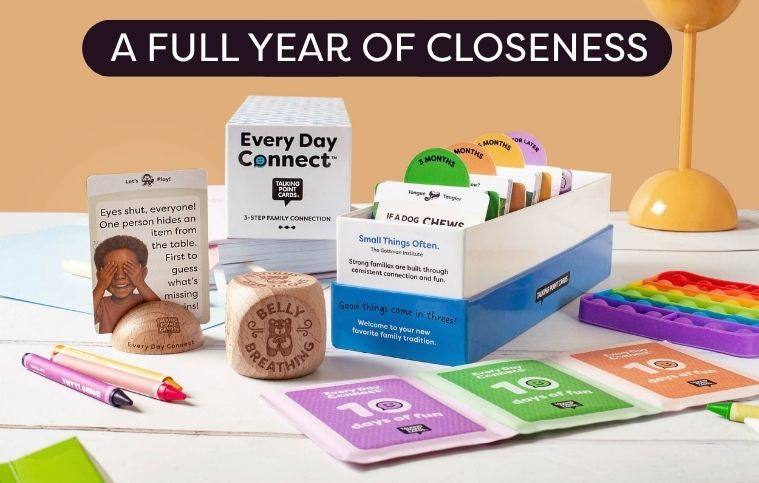SHOP
About
The Wake Up Call That Changed Everything
Why Family Dinner Conversation Actually Matters (More Than You Think)
The Problem Every Parent Faces (But Nobody Really Talks About)
The Simple Solution That Saved Our Dinner Table
Week One: The Transformation Begins
Why This Works When Everything Else Doesn't
The Long Game of Family Connection
Why Cards Work Better Than Good Intentions
Creating Your Own Family Conversation Revolution
Shop Family Products
Last Tuesday night, I sat at our kitchen table staring at my 8-year-old daughter's face, illuminated by the blue glow of her tablet. My 12-year-old son was texting someone under the table, and my husband was scrolling through emails between bites of reheated pasta.
This wasn't exactly the warm family moment I'd imagined when I'd hurriedly thrown dinner together an hour earlier.
I used to think family dinners would just... happen naturally. You know, like in those commercials where everyone's laughing and sharing stories about their day, and nobody's asking if they can "just finish this one level" before eating.
Turns out, meaningful family conversation doesn't magically appear just because you've managed to get everyone sitting at the same table at the same time. (Which, by the way, is already an Olympic-level achievement in most households.)
The Wake-Up Call That Changed Everything
The moment I realized we had a problem wasn't dramatic. It was actually painfully ordinary.
I'd asked my usual conversation starter: "How was everyone's day?"
The responses were as predictable as they were deflating:
-
"Fine." (Without looking up from phone)
-
"Good." (Still typing)
-
"Can I have more water?" (The closest thing to actual engagement)
That's when it hit me. We were physically together but emotionally miles apart. Recent research shows that 77% of families admit to eating with their phones at the table, and when families do have dinner together, one in four don't talk to each other at all.
I wasn't just watching my kids choose screens over conversation – I was watching us miss out on one of the most powerful tools for raising confident, connected children.
Why Family Dinner Conversation Actually Matters (More Than You Think)
Here's what I wish someone had told me earlier: family dinner isn't just about making sure everyone gets fed. It's actually one of the most impactful things you can do for your child's development.
Research shows that for young children, dinnertime conversation boosts vocabulary even more than being read aloud to. Think about that for a second. More than reading bedtime stories. More than educational apps or flashcards.
Just... talking.
The mental health benefits are equally impressive: regular family dinners are associated with lower rates of depression, anxiety, substance abuse, eating disorders, and higher rates of resilience and self-esteem.
But here's the thing that really got me: Studies spanning more than two decades show that kids who eat with their families do better in school, have bigger vocabularies, and over three decades of research have shown that regular family meals offer a wide variety of physical, social-emotional and academic benefits.
All from sitting around a table and talking. No special equipment required. No expensive tutoring or enrichment programs.
Just conversation.
The Problem Every Parent Faces (But Nobody Really Talks About)
So why don't more families have these magical dinner conversations?
Because asking "How was your day?" gets boring fast. And when you're juggling work deadlines, homework battles, and the mental load of keeping everyone fed and somewhat functional, coming up with interesting conversation topics feels like just another thing on your endless to-do list.
Plus, let's be honest – sometimes our kids give us nothing to work with.
"What did you do at school today?"
"Nothing."
"Did anything interesting happen?"
"No."
"Did you... breathe oxygen?"
"Maybe."
It's enough to make any parent throw in the conversational towel and just let everyone eat in peaceful, phone-scrolling silence.
The Simple Solution That Saved Our Dinner Table
That's when I stumbled across something that felt almost too simple to work: conversation starter cards designed specifically for families.
I'll admit, my first reaction was skeptical. Cards? To talk to my own children? Wasn't that a bit... artificial?
But I was desperate enough to try anything, so I ordered a deck and decided to give it a week.
The first night, I put away everyone's devices (including mine – this was harder than I expected) and placed a small stack of cards next to the salt and pepper.
"New rule," I announced. "Everyone picks a card and we all answer."
Eye rolls. Dramatic sighs. My son actually said, "This is so weird, Mom."
But something interesting happened when my daughter picked the first card and read: "Would you rather be able to fly or turn invisible?"
Suddenly, my usually quiet 8-year-old was explaining in vivid detail how she'd choose invisibility to sneak into the school cafeteria and change the lunch menu to include more chocolate. My teenager forgot to be too cool for the conversation and started making a compelling case for why flying would be way more practical than being invisible.
And me? I learned that my husband has been secretly wanting the ability to pause time so he could get more sleep.
Twenty minutes later, we were still talking. No phones. No tablets. Just us.
Week One: The Transformation Begins
By night three, something shifted. My kids started looking forward to "card time." They'd race to the table to see what questions we'd get.
Some cards led to hilarious conversations ("Would you rather be a giant mouse or a miniature elephant?"). Others opened doors to deeper discussions ("What's something you've always wanted to learn but never had the chance to try?").
The magic wasn't in the cards themselves – it was in what they gave us permission to do. To be curious about each other. To share silly thoughts and serious dreams. To actually listen.
I started noticing changes beyond dinnertime too. My daughter began volunteering information about her day without being asked. My son started asking follow-up questions when I mentioned work stress.
Research backs this up: families who eat together often tend to get along better and talk more openly. The conversation skills they were practicing at dinner were carrying over into the rest of our family life.

Rated #1 Family Product
Strengthen family bonds, spark fun and meaningful conversations, and create connection that lasts.

Why This Works When Everything Else Doesn't
Here's what makes conversation cards different from just trying harder to think of good questions:
They're specifically designed for mixed ages. No more struggling to find topics that interest both your 6-year-old and your teenager. These questions work for everyone from elementary school through high school (and honestly, most adults find them engaging too).
They remove the pressure. Instead of feeling like you need to come up with the perfect conversation starter, you just flip a card. It takes the mental load off parents and puts the focus back on connecting.
They're created by experts. These aren't random questions someone thought up. They're crafted by family communication specialists who understand child development and relationship dynamics.
They create positive associations with family time. When dinner becomes something fun rather than just another daily obligation, kids actually want to participate.
The Ripple Effect You Don't Expect
Three weeks in, I noticed something I hadn't anticipated. The conversations were changing more than just our dinner table – they were changing our relationships.
My kids started opening up about things that mattered to them. Real things. Friendship drama. Worries about school. Dreams for the future. The kind of stuff they used to keep to themselves or only share with friends.
These conversations help kids experience themselves as part of something larger than themselves, which makes them more resilient, better adjusted, and more successful in school.
I was getting to know my children in ways I'd been missing. Their humor. Their values. Their fears and hopes and weird random thoughts.
And they were getting to know me too – not just as "Mom" but as a person with my own stories and opinions and embarrassing childhood memories.
Making It Work in Real Life
Look, I'm not going to pretend this solved all our family dinner challenges. Some nights we still eat in relative silence because everyone's tired or stressed or just not in the mood to chat.
But having the cards there gives us an option. A bridge back to connection when we need it.
Here's what I've learned about making family conversation work:
Start small. You don't need to transform into the picture-perfect family overnight. Even two or three cards a week makes a difference.
Let kids lead sometimes. When they get to choose the questions, they're more invested in the conversation.
Don't force it. If someone's having a rough day, respect that. The goal is connection, not performance.
Be genuinely curious. Kids can tell when you're really listening versus just going through the motions.
Share your own stories. When you answer the questions too, it models openness and makes the conversation feel more balanced.
The Long Game of Family Connection
I used to think family dinners were about getting through the meal and making sure everyone ate their vegetables. Now I realize they're about something much more important: building the foundation for lifelong relationships with our children.
Family dinners improve literacy skills for younger kids, but the benefits go so much deeper than academic achievement. They're creating patterns of communication that will serve our families for years to come.
When my kids are teenagers dealing with bigger challenges, I want them to know they can talk to us. When they're adults making major life decisions, I want our relationship to be strong enough that they feel comfortable coming to us for advice.
Those foundations are being built right now, one dinner conversation at a time.
Why Cards Work Better Than Good Intentions
Here's the truth: I'd been trying to have better family conversations for years. I'd read articles about the importance of family dinner. I'd made mental notes to ask more interesting questions.
But good intentions aren't enough when you're tired and everyone's hungry and you're already thinking about the dishes and tomorrow's packed lunches.
Having a simple system – something tangible you can just grab and use – makes all the difference. It removes the friction between wanting to connect and actually doing it.
The cards don't do the work for you, but they make the work possible.
Creating Your Own Family Conversation Revolution
If you're reading this and recognizing your own dinner table in my story, here's my challenge to you: give it one week.
Seven dinners. Seven conversations that go deeper than "How was your day?"
You don't need perfect timing or ideal circumstances. You just need to start.
Because here's what I've learned: our kids aren't going to magically start talking to us when they're teenagers if we don't create space for conversation now. The patterns we establish at age 8 and 12 become the foundation for the relationship we'll have when they're 18 and 22.
Family dinner conversation isn't just about passing time over food. It's about passing down values, building trust, and creating memories that will matter long after your kids have moved out and started families of their own.
The research is clear, the benefits are real, and the solution is simpler than you think.
Your family's conversation revolution can start tonight.
What would happen if you put away the phones, pulled out some thoughtful questions, and just... talked? There's only one way to find out.
----------
Ready to transform your family dinners from silent phone-scrolling sessions into memory-making conversations? The journey starts with a single question – and the willingness to really listen to the answers.
At Talking Point Cards, we believe that meaningful connection starts with simple, heartfelt conversations. Our collection of easy-to-use, engaging conversation starters helps families of all shapes and sizes put down their screens, lean in, and truly listen to one another - one question at a time. Because stronger families aren’t built in grand gestures - they’re built in everyday moments.
Let's Stay Connected
Love what you’re reading? There’s more where that came from. Get fresh ideas, inspiring tips, and simple ways to spark deeper conversations - delivered straight to your inbox. Because the best connections start here. Just pop in your email below to join us.
We respect your privacy. We’ll never share or sell your information. By subscribing, you agree to receive emails from us. Unsubscribe anytime.












